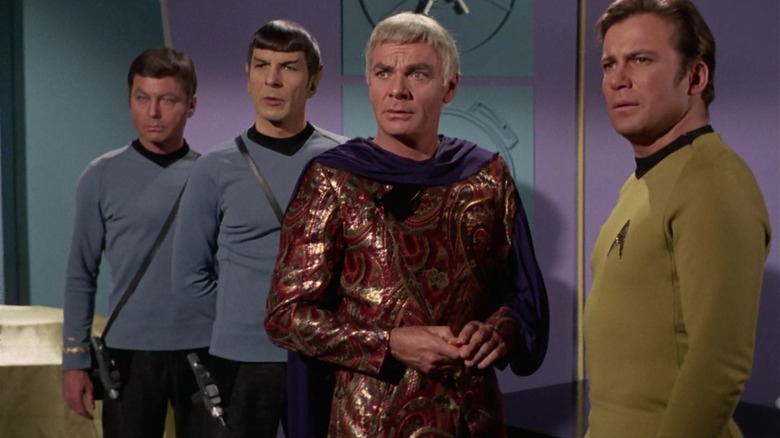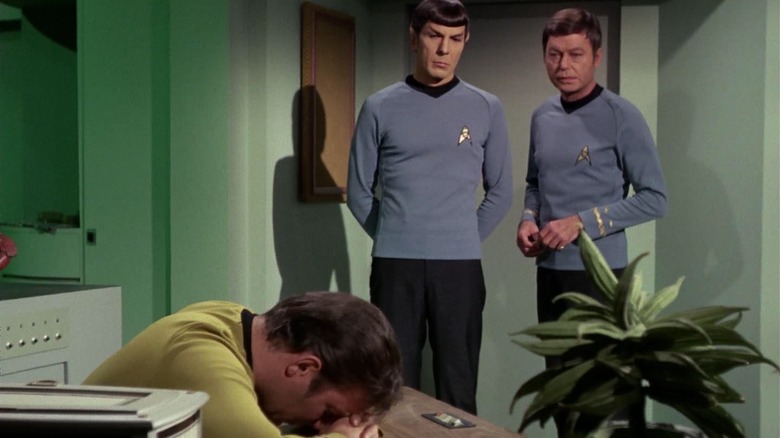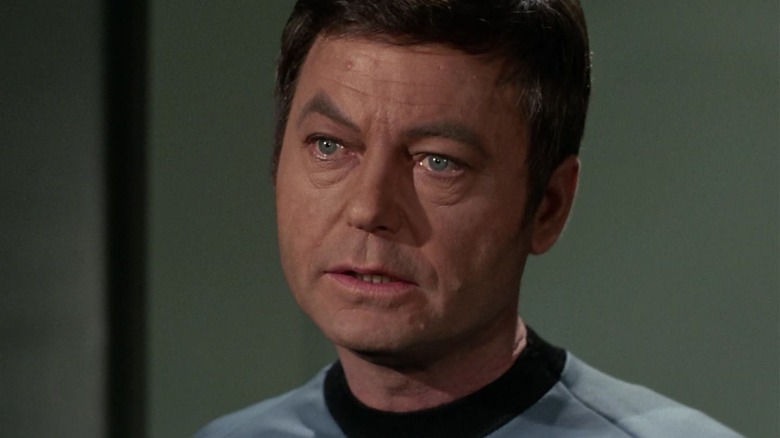The Requiem For Methuselah Scene Star Trek's DeForest Kelley Refused To Film
In the "Star Trek: The Original Series" season 3 episode "Requiem for Methuselah," the Enterprise crew has become infected with a deadly disease. They travel to a remote and presumed-uninhabited world called Holberg 917-G looking for the substances they require to make a cure. They find, living there, a mysterious aristocrat named Flint (James Daly) who lives in a posh mansion surrounded by ancient works of Earth art, alongside his attractive young ward Reyna (Louise Sorel). Flint's mansion is protected by a strange, orb-shaped robot, and an investigation finds that Flint's possessions are written in the handwriting of Leonardo da Vinci, Johannes Brahms, and other notable artists. Reyna and Kirk (William Shatner) immediately take a shine to each other and play a game of pool while Dr. McCoy (DeForest Kelley) goes looking for the desired medicine.
Flint eventually reveals that he is immortal, having learned artistic mastery in his six millennia of life. He was da Vinci, and he was Brahms. He was also Alexander the Great, Solomon, and several others. Flint, understandably, need privacy to keep his immortality a secret, but he is also lonely. He also reveals that Reyna is not his ward, but an android he built to keep him company. She is only one of many failed models. Kirk has fallen deeply in love, but the newfound feelings of love in Reyna's android brain ultimately kill her.
The writer of "Requiem for Methuselah," Jerome Bixby, was very fond of poetry and classic literature, and tried to write the purplest of prose. In the oral history book "Captains' Logs: The Unauthorized Complete Trek Voyages," edited by Mark A. Altman and Edward Gross, Bixby revealed that the final lines of dialogue in the episode's final scenes were far too flowery for Kelley. Bixby was asked to tone it down.
The word 'love' isn't written in your book
The final scene of "Requiem for Methuselah" sees Kirk, back on board the Enterprise, sulking in his quarters. He was deeply in love with Reyna, and mourns that her love for him was what destroyed her brain. McCoy and Spock (Leonard Nimoy) visit Kirk to tell him that the disease has been cured. McCoy takes the opportunity to explain love to the emotionless Spock, bitter that his Vulcan co-worker has deliberately chosen to eschew the glories — and the pains — of love:
"Considering his opponent's longevity, truly an eternal triangle. You wouldn't understand that would you, Spock? You see, I feel sorrier for you than I do for him. Because you'll never know the things that love can drive a man to. The ecstasies, the miseries. The broken rules, the desperate chances. The glorious failures and the glorious victories. All of these things you'll never know, simply because the word 'love' isn't written into your book."
That speech was originally much longer. Bixby envisioned a scene where Kelley would give an extended monologue about the glories of love and Spock's emotional ignorance. But as he recalls, Kelley took one look at the script and turned it all down:
"Some of my dialogue near the end between Spock and McCoy where McCoy is really coming down on Spock and saying, 'You poor schmuck. You have no emotions. You can't live. You'll never know what love is like. That hope doesn't exist for you,' etc. I pulled out all the stops and wrote about 15 pages of dialogue that De Kelley absolutely refused to utter."
Kelley thought it was way too poetic, and Bixby agreed; it was inspired by T.S. Eliot. The scene was cut.
The short, short version
But cutting the scene entirely robbed "Requiem for Methuselah" of a proper dénouement, or "tag," as they say in the screenwriting biz. As such, the episode's director, Murray Golden, asked that it be partially restored. Bixby recalls writing out a short version of his ending in literally minutes while sitting on a notable piece of furniture. Bixby said:
"[Director] Murray Golden wanted to do the tag. He wanted to do that ending. But he said, 'We can't do that without dialogue. It just won't play.' So I said, 'Give me three minutes,' and I went over and sat down in Captain Kirk's chair on the Enterprise set and rewrote the speech right there, because I didn't want to lose that ending either. Five minutes later they had a draft."
Kelley seems to have approved of that version, as he read it with aplomb. It's still a little hifalutin and stagey, but it works. Given the classical bent of the episode, McCoy's poetic speech about the agony and ecstasy of love is fitting.
After McCoy leaves the room, having properly lambasted Spock for his ignorance of love, Spock does something weirdly sensitive. He leans into the mourning Kirk, places a hand on his face, and initiates a Vulcan mind meld. Spock implores that Kirk "forget," erasing the painful relationship from his captain's memory. While Kirk would likely have objected to the simple erasure of personal pain — indeed, it was something he would do in "Star Trek V: The Final Frontier" — Spock's gesture was clearly meant to aid a struggling friend. The ethics of Spock's gesture can be debated, but a viewer can understand why he did it.


